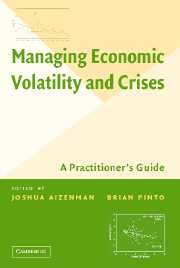Book contents
- Frontmatter
- Contents
- Contributors
- Acknowledgments
- Foreword
- MANAGING ECONOMIC VOLATILITY AND CRISES
- Overview
- PART I WHAT IS VOLATILITY AND WHY DOES IT MATTER?
- PART II COMMODITY PRICES AND VOLATILITY
- PART III FINANCE AND VOLATILITY
- PART IV MANAGING CRISES
- 8 Managing Macroeconomic Crises: Policy Lessons
- 9 Lessons from the Russian Crisis of 1998 and Recovery
- 10 Argentina's Macroeconomic Collapse: Causes and Lessons
- 11 Default Episodes in the 1980s and 1990s: What Have We Learned?
- Technical Appendix
- Index
- References
9 - Lessons from the Russian Crisis of 1998 and Recovery
Published online by Cambridge University Press: 25 July 2009
- Frontmatter
- Contents
- Contributors
- Acknowledgments
- Foreword
- MANAGING ECONOMIC VOLATILITY AND CRISES
- Overview
- PART I WHAT IS VOLATILITY AND WHY DOES IT MATTER?
- PART II COMMODITY PRICES AND VOLATILITY
- PART III FINANCE AND VOLATILITY
- PART IV MANAGING CRISES
- 8 Managing Macroeconomic Crises: Policy Lessons
- 9 Lessons from the Russian Crisis of 1998 and Recovery
- 10 Argentina's Macroeconomic Collapse: Causes and Lessons
- 11 Default Episodes in the 1980s and 1990s: What Have We Learned?
- Technical Appendix
- Index
- References
Summary
ABSTRACT: This case study covers events from mid-1995, when Russia's quest for single-digit inflation began, to the end of 2002. The focus is on Russia's 1998 crisis and subsequent recovery. These events offer valuable lessons for countries facing simultaneous problems of unsustainable public debt dynamics and low international liquidity – a list that in recent years has included Argentina, Brazil, and Turkey. Lessons include implications for the appropriate design of rescue packages, moral hazard, and factors driving postcrisis recovery. This study presents a framework that may make it possible to distinguish between a first-generation and second-generation crisis by juxtaposing economic fundamentals and market signals. This could help in making the judgment about whether a soft landing scenario supported by the announcement of a fiscal-structural reforms package and liquidity injections from the international financial institutions (IFIs) is feasible, or whether the abandonment of the exchange rate target and even a possible debt restructuring may be unavoidable.
THE RUSSIAN MELTDOWN: IMPLICATIONS FOR OTHER CRISIS EPISODES
In February 1998, Russia attained its goal of single-digit inflation set under the stabilization program that began in mid-1995. Only six months later, it experienced a comprehensive macroeconomic collapse, involving its exchange rate, the banking system, and public debt. This occurred soon after a large rescue plan put together by the international financial institutions (IFIs) took effect.
Information
- Type
- Chapter
- Information
- Managing Economic Volatility and CrisesA Practitioner's Guide, pp. 406 - 438Publisher: Cambridge University PressPrint publication year: 2005
References
Accessibility standard: Unknown
Why this information is here
This section outlines the accessibility features of this content - including support for screen readers, full keyboard navigation and high-contrast display options. This may not be relevant for you.Accessibility Information
- 5
- Cited by
